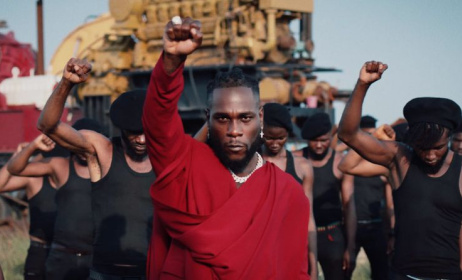Why you might not need a record label
All artists, especially up-and-coming ones, have two basic career options: get a record deal or go independent.
 Brymo and Johnny Drille have worked independently and with record labels.
Brymo and Johnny Drille have worked independently and with record labels.
Most, however, seem to see only one option—hence the rush for record deals. As much as signing a record deal can cause an artist’s career to rapidly shoot up, it could also be the reason it won’t take flight; and in some cases it causes artists’ career to fly initially and wobble later on.
It is important to ask: are these deals worth it? Some are but there is an often undervalued, yet viable alternative of artists being independent, and although it comes with its own challenges, it offers its own type of gains.
Traditionally, a record deal binds an artist and a record company to an agreement that tasks the artist with the responsibility of creating music and video content while the label handles the marketing and distribution of the content.
Signed artists take advantage of the strength of the label’s distribution network to efficiently reach their audience. This usually means signing off a significant portion of the generated revenue to the label. Aisosa Okundaye, a PR executive of Chocolate City record label, says that in the Nigerian music industry, the revenue sharing ratio is 60 – 40 or 70 – 30, with more for the label.
“70 for the label,” says artist manager Tobi Mohammed. “30 for the artist. The manager is somewhere in between.”
Thinking about it, 70% is a lot but perhaps not too much if you are investing tens of millions of scarce naira into a chancy business. The situation has been described as requesting for a loan with no guarantee of repayment. Ed Sheeran’s producer, Jake Gosling, compared seeking a record deal to walking into the bank to :
“I can only imagine walking into a bank asking for a £100,000 loan, saying: ‘I'd like to use it to pay my living and work expenses for the next four years so that I can develop my craft by being able to write full-time and work with songwriters all over the world. You'll make it back from the royalties the songs I write during those years will accumulate. And if you don't, I don't have to pay that money back. What? You need some kind of guarantee? Just listen to these new songs I've written.’ They'd laugh me straight out of the door.”
Record labels won’t. They would take the risk and pump funds into the career of talents even with the knowledge that with Dangote’s money an artist can still fail to hit commercial success. What is known to guarantee success for signed acts is the quality of the label’s structure – the board, marketing team, press team, radio pluggers, account department, legal team. Labels with such structure have proven to be more efficient in building the long term career of artists.
Sadly, properly structured labels in our industry are rare. Majority of what we call record labels are only just indie labels that are run as experimental projects by their owners, sometimes popular artists whose finances are just as good as their mercurial income. Some of these labels are lacking in the area of structure and expertise. “Most (Nigerian) record labels just have capital, no manpower and they do not know what they are doing”, popular publicist, Ogagus said. This is why a lot of Nigerian labels run for a period and end up crumbling, along with the career of their signee(s) in some cases.
It is in the interest of artists to walk into deal negotiations with a clear vision of their target and an understanding of what the label is offering, not just in terms of funding, but also in terms of expertise and structure. This is important because such decisions are directly tied to the long term relevance of the artist. A smart artist would come with a manager and a legal adviser (or someone who can combine both roles) to the negotiation table.
Alternatively, artists have the option of independence which allows for growth on their own terms. This option, however, leaves them with more responsibility, and a possibility of earning more. Being independent means handling both the creative and the marketing aspect of the music. The case of former Chocolate City singer, Brymo, is an example of how to efficiently function as an independent artist. Functioning as an independent artist requires an understanding of the two-way responsibility – the art aspect that involves creating the content and marketing aspect that involves figuring out the nature of the content, the right audience for it, where to find them and how to pitch it to them.
Brymo’s case, with his independence, has a twist to it – he had to convince his audience about his switch to an unpopular artistic direction. The critic Wilfred Okiche referred to Brymo as a “singer who despite briefly attaining the highest echelons of pop superstardom, chose to trade it all for a less visible but more self-satisfying spot as an artist, in tune with his muse, and speaking directly to a cross-section of cultivated fans.”
Brymo’s success has a heavy influence of the internet. The singer acknowledged the role of the internet in his operation as an indie artist saying, “the internet is the best tool we have right now because not only do you get to be popular there but people also can buy your singles there. Unlike in the past where you had to depend on store sales, this time around everything happens online, just by one click people can get your album. Yes, the internet is still the No.1 tool that independent artists can use to push their music.”
The role of the internet in connecting with your audience as an independent artist is immense indeed. The internet is increasingly influencing the business of music marketing, especially with the advent of streaming and download platforms. “In today's business, people have to be careful what they sign. We now have YouTube, streaming, Soundcloud and all these ways through which you can get music out quickly”, WarnerChappell CEO, Jon Platt, said during an interview on Rap Radar Podcast.
Just like shooting without an aim, using the internet without a strategy would likely not yield result. Pushing out content has to be strategic and that is one of the things successful labels do—these labels utilise the skill and expertise of their team to connect their signees with the right audience.
"It is not enough for an artist to think ‘I understand radio promotion or if I put my song on this blog, I would get result,'" says Okundaye, who has handled publicity for Chocolate City for years. An artist does not necessarily need to lean on a label to wield the power of the internet. It is only scary that there are more cases of failure than successes, but it does not mean it is impossible.
For indie artists like Brymo who succeed at reaching their audience, it is a feeling of two folds of fulfillment, because having complete creative freedom could be even more satisfying than getting more revenue. Brymo said, “the best part of being an independent artist is having the creative freedom to decide when to record a song, when to release it, the direction you want your project to go and you choose to talk about.” It is also possible for signed acts like Simi and Johnny Drille to have a great deal of creative freedom but it is easier to get an Asa collaboration than to find labels that would agree to such arrangement.
The option of creative freedom and increased revenue share sounds very convincing but without a working rollout system, an independent artist can make the best music, yet not profit from it. This is why labels are important, however, a label without a structure, even with the backing of a bank, is a ditch in disguise. Still, the funds offered by labels makes them an option to consider and until there are other sources of funding like direct investment from streaming companies like Apple and Spotify, considering label money would always be worth it.
Actually, both options are to be considered, approaching music focusing on only one option is the reason artists rush and sign bad deals. There are two viable options and choosing the right option is about understating what’s available and what is to be achieved knowing which suits you as an artist.
In Okundaye's words, “If you are running on the level of an independent artist but you want to see results on the level of an artist signed to a record label, then my friend you will run into trouble.”





























Comments
Log in or register to post comments